Nipsey Hussle died in the Marathon Clothing lot. Will his legacy die there too?
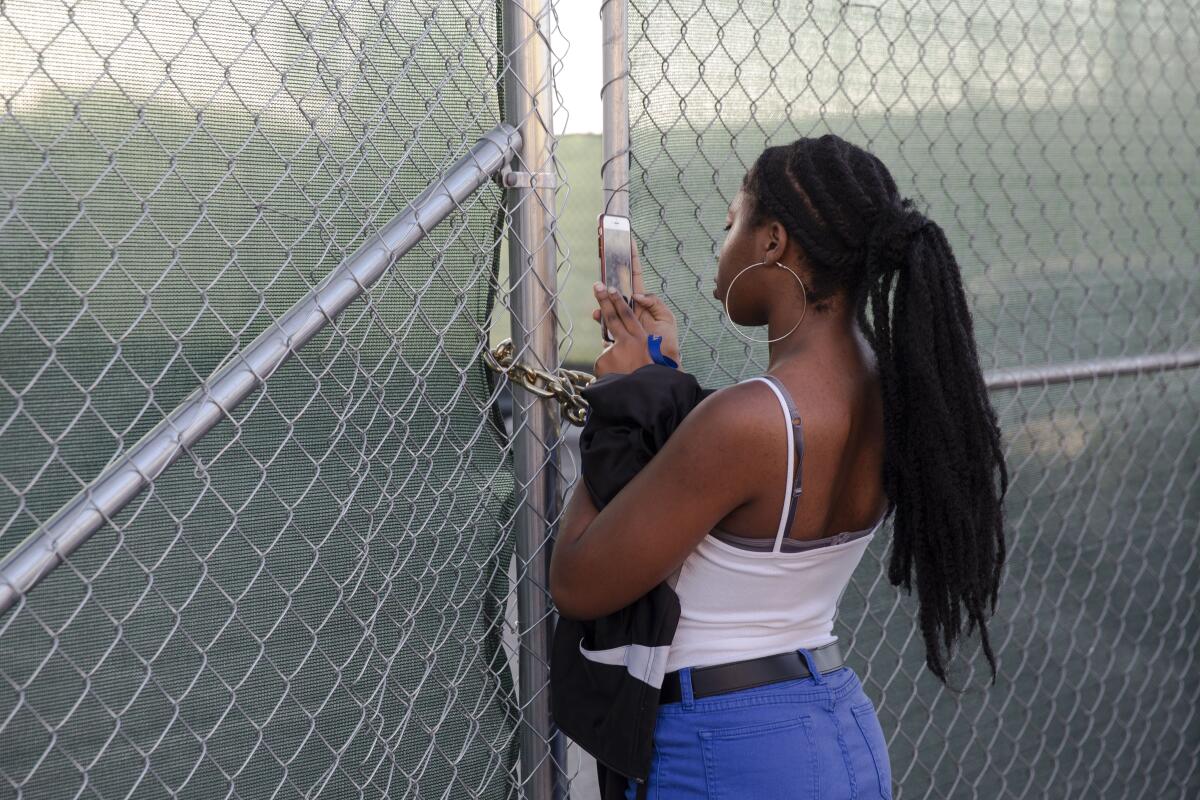
- Share via
Nipsey Hussle’s star power radiated from a single point — the South Los Angeles strip mall where he sold CDs from his car as a fledgling rapper and where he centered his business ventures as his celebrity grew.
In the months since the rapper and activist was gunned down there on March 31, the rectangle of asphalt at Slauson Avenue and Crenshaw Boulevard has become more hallowed still.
Fans have descended from all over to snap selfies in front of Hussle’s store, the Marathon Clothing, and next to the larger-than-life murals that have sprouted up to honor a man who was a beacon of hope for African Americans.
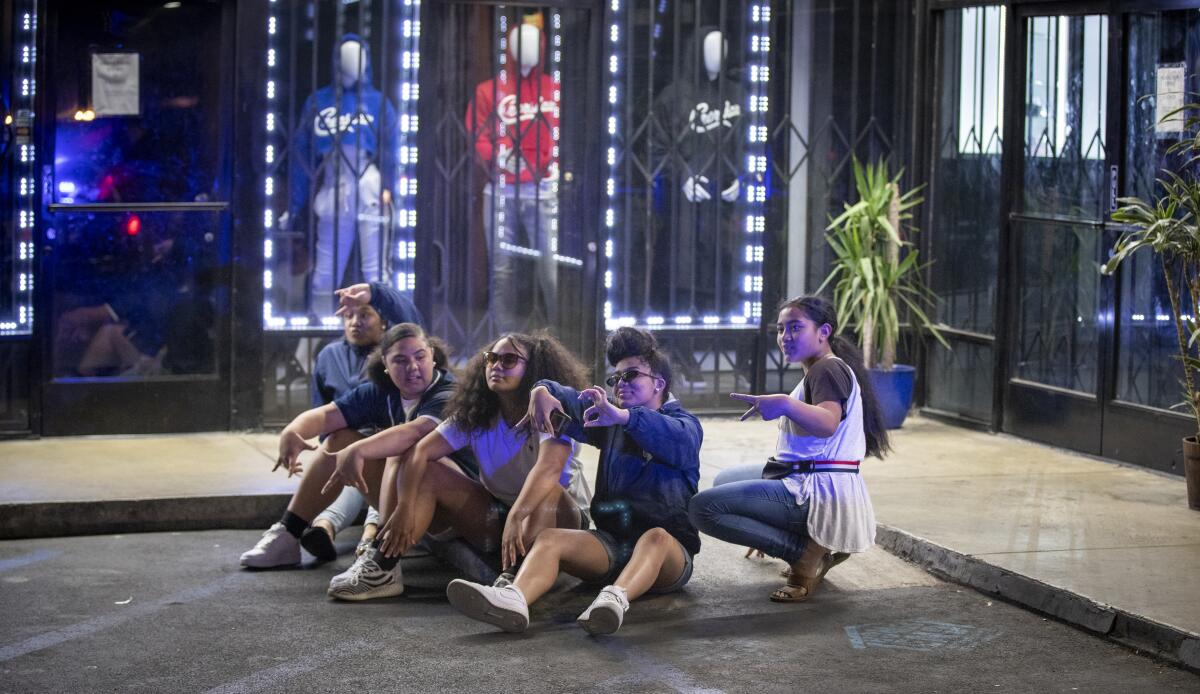
But trouble that has long brewed at the strip mall has taken on larger dimensions since Hussle’s death.
Hussle’s fellow Rollin’ 60s Crips, grieving a homie who made it big yet kept it real, continued to hang out there. Tourists have been robbed. A man was fatally stabbed.
And then earlier this month, a fence went up.
Hussle’s business partner, David Gross, said he had erected the fence in preparation for the property’s next phase — a mixed-use development called “Nipsey Hussle Tower” that will include a museum.
But there is more to the story, documents examined by The Times show, including allegations of a violent melee at the store. City officials also have been pressuring Gross to tamp down crime at the property.
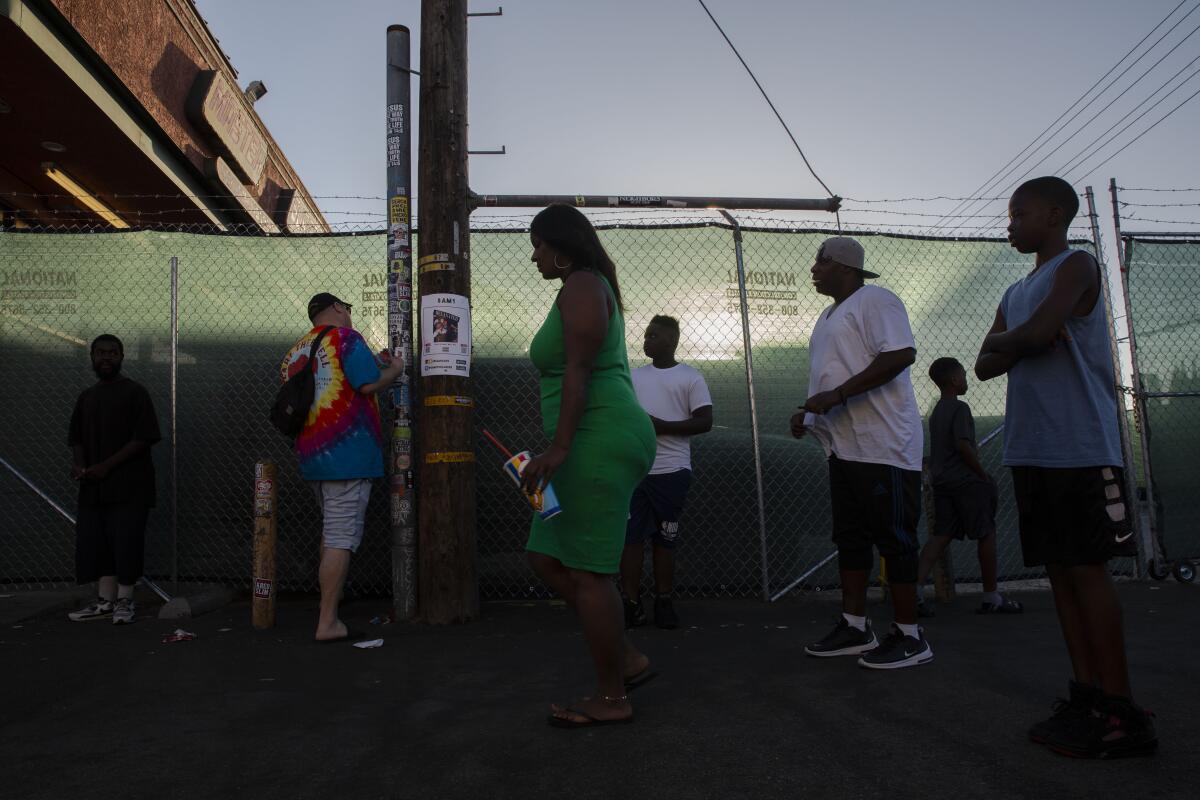
Residents acknowledge that there is crime in the area, but attribute it to long-standing gang issues, not to Hussle’s store. Some wonder if a conspiracy is afoot to seize the property and tarnish the legacy of a black man who sought to uplift his community through entrepreneurship.
Hussle fought to establish a foothold there, dodging police in the early years, then scraping together enough money to purchase it after the landlord tried to evict him. To locals, the strip mall has come to embody the forces Hussle battled in his own life and that South L.A. continues to face — gang crime, encroaching gentrification and tensions with law enforcement.
In a recent Instagram post, Gross said city attorneys have been on a crusade to expel the Marathon Clothing from the strip mall, redoubling their efforts after Hussle’s death with a civil nuisance abatement investigation.
“They play the long game and will surely find a way to [mess with] us,” Gross wrote. “The Los Angeles City Attorney’s Office was trying to end us. Literally.”
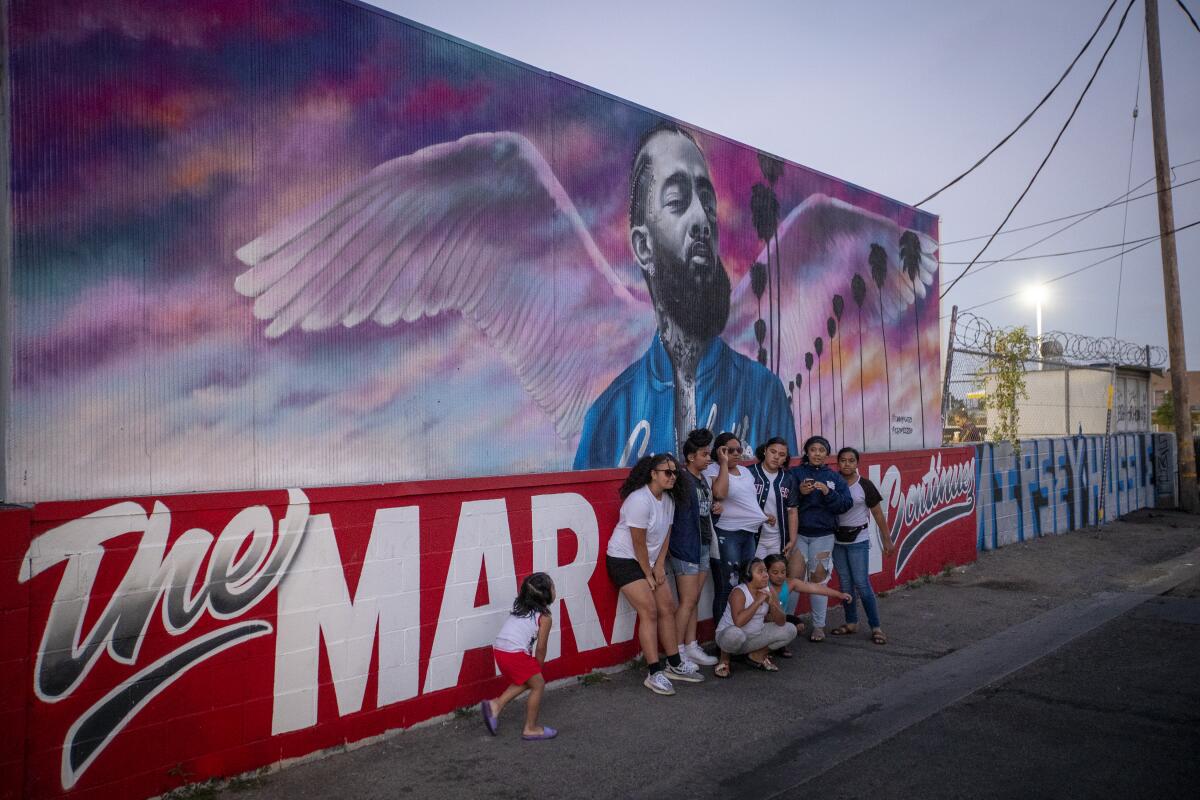
**
The strip mall long had been known as a Rollin’ 60s hangout.
Over the years, police made many arrests there, including of Hussle for allegedly resisting an officer in August 2014. Hussle, whose legal name was Ermias Asghedom, does not appear to have been charged in the case, according to court records.
“He used to sell CDs out the trunk, be in that parking lot. They used to try to kick him out of that lot,” Samiel Asghedom said at his brother’s memorial service in April. “Y’all know what we went through with the police in that lot.”
The brothers had owned a T-shirt store there since 2008. They eventually revamped and renamed it, opening the Marathon Clothing in June 2017 to a throng of fans eager to purchase shirts emblazoned with “Crenshaw” in cursive.
If you stopped by, you might have run into Hussle, who was often there, willing to pose for selfies and rarely accompanied by an entourage.
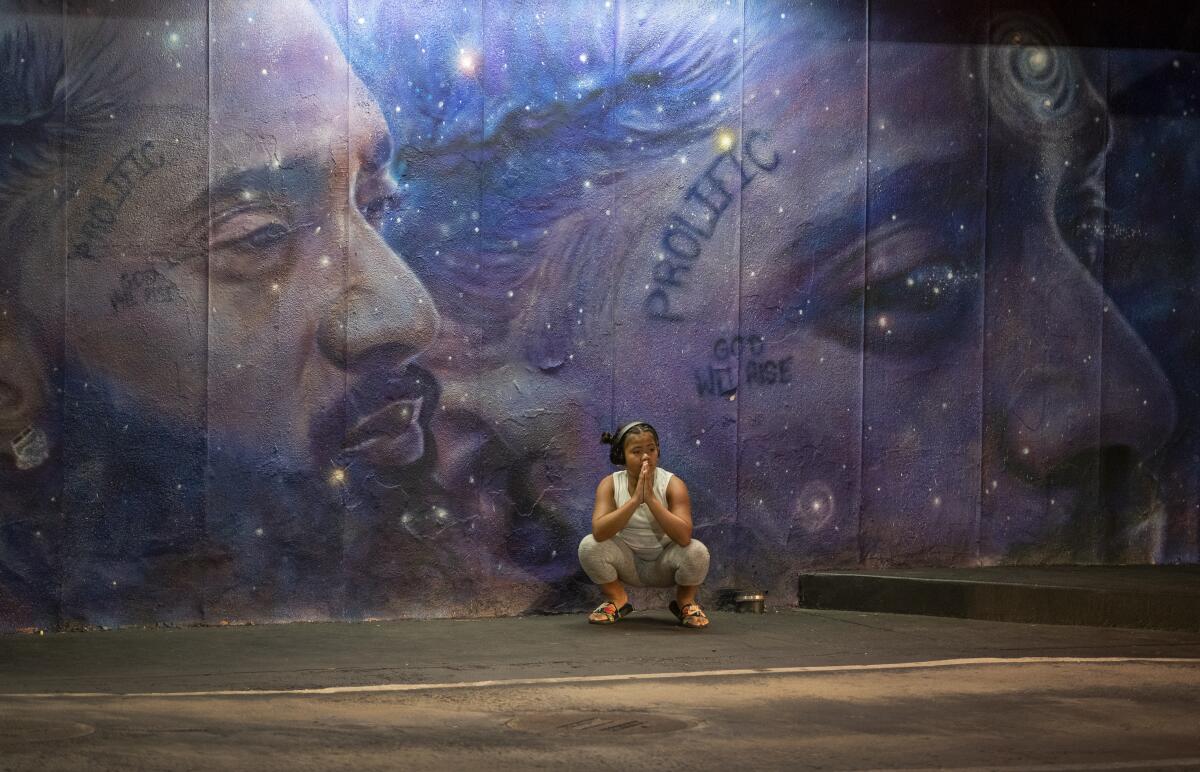
Many in Hussle’s orbit were Rollin’ 60s Crips, from employees to acquaintances who asked him to listen to their mixtapes, though not all were actively gangbanging. Hussle and his employees used their street cred to clear the parking lot if anyone was making trouble.
But an incident allegedly involving Hussle’s family pushed the then-owners to start eviction proceedings, according to documents obtained by The Times.
A man was punched, hit over the head with a lead pipe and stabbed in the back at the store on Sept. 14, 2018 — resulting in a deep head laceration, possible traumatic brain injury and vision loss, according to the eviction notice filed by property manager E.Y. Song.
Police records show that Samiel Asghedom was arrested on suspicion of attempted murder in the case. But within weeks, the L.A. County district attorney’s office dropped the charge.
The Los Angeles County district attorney’s office decline to file charges against Nipsey Hussle’s brother, Samiel Asghedom.
The victim, who was also a Rollin’ 60, may have arrived at the store with a gun intending to shoot Asghedom, Deputy Dist. Atty. Alice Kurs wrote in a memo explaining why she declined to prosecute. The beating may have been done in self-defense or an attempt to disarm the victim, she wrote.
Multiple witnesses to the Sept. 14 incident heard gunshots, and the victim was seen on video retrieving an object from his car before walking toward the store, the memo said. Minutes later, the video showed the victim being pursued by people and retreating. He denied he had a gun and would not say how the conflict started or cooperate with the investigation beyond an initial statement, according to the memo.
Samiel Asghedom’s attorney, James Bryant II, said the allegations against his client were inaccurate but would not elaborate. Song, the property manager, could not be reached for comment.
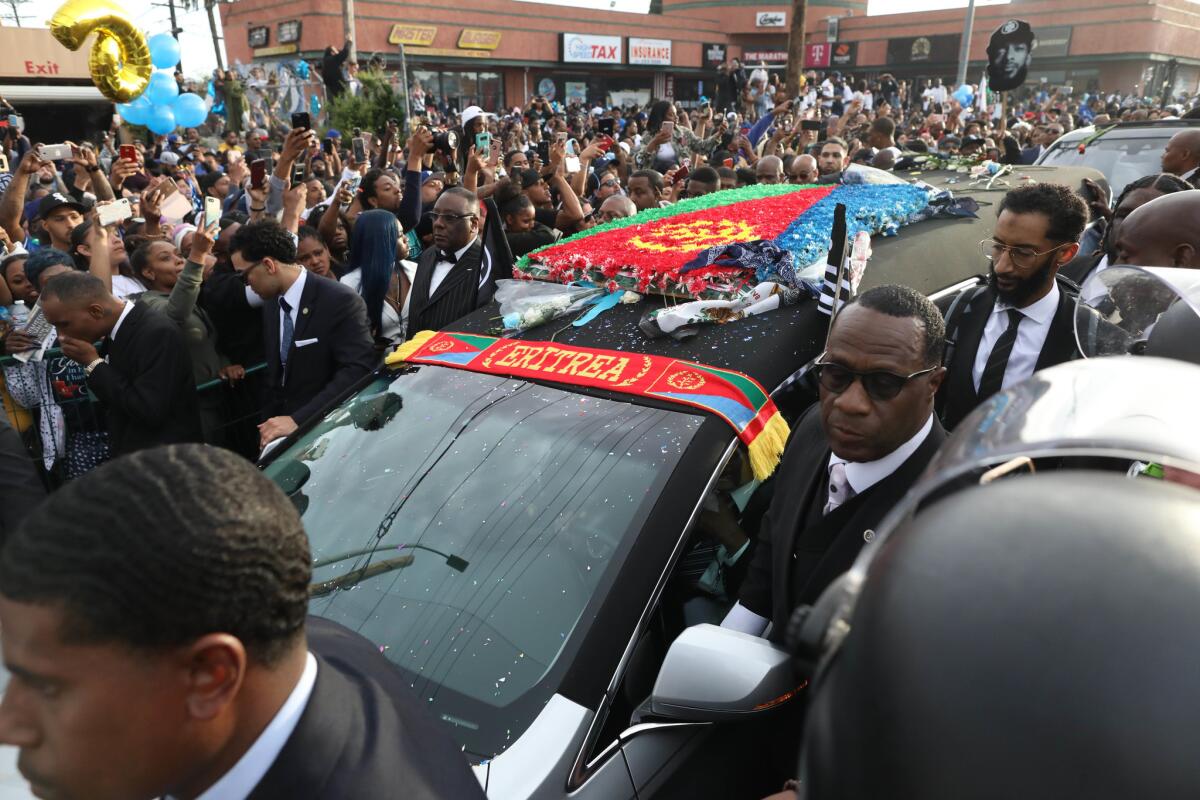
Soon after the parking lot beating, according to documents obtained by The Times, City Atty. Mike Feuer’s office notified owners Jong Soo Lee and Ho Haeng Lee that their property was a gathering spot for the Rollin’ 60s. In a follow-up letter on Nov. 15, 2018, Deputy City Atty. Nancy Hagan wrote that she was expecting the owners to implement remedial measures, including assigned parking spaces and surveillance cameras accessible only to law enforcement.
By the time the eviction notice arrived on Nov. 14 , Hussle and Gross had begun trying to buy the strip mall — home to a barbershop, fish market, tax preparation office, insurance agency and mom-and-pop fast-food joint, in addition to the Marathon Clothing. The owners initially rebuffed their overtures, but eventually decided to sell, Gross said.
Gross, who is African American and has roots in South L.A., told The Times late last month that he and Hussle worked for months to secure a loan — a process complicated by Hussle’s criminal record, which included several gun convictions. The $2.5-million sale was finalized in January of this year.
“I don’t know how we did it, but we were able to close and get the lot,” Samiel Asghedom said at his brother’s memorial service. “Nip put his heart and soul on Crenshaw and Slauson.”
The sale, however, did not stop the city attorney’s office from pushing for action.
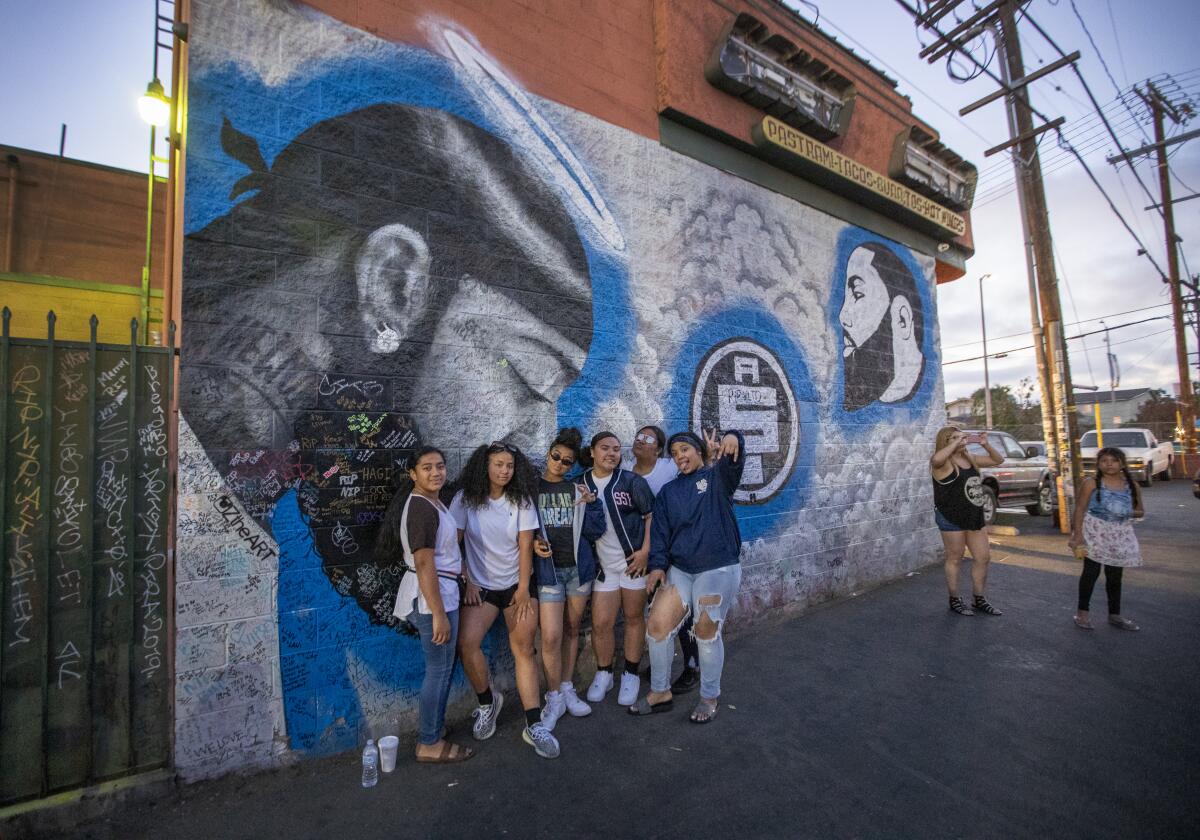
In a Feb. 13 letter, Hagan notified Gross and Hussle that criminal activity at the strip mall was creating a public nuisance.
The property “has been the site of many violent and/or unlawful incidents including, without limitation, attempted murder, shootings, robberies, batteries and unlawful firearm possession,” Hagan said in requesting a meeting with the new owners. If Hussle and Gross did not address the alleged illegal activity, city attorneys could file a civil enforcement action, the letter said.
Gross said in his recent Instagram post that the city attorney’s office “hated (with ALL their heart) that their maniacal zeal to expel the Marathon Store from Slauson Plaza actually resulted in us buying it and planning to develop it.”
A spokesman for the city attorney’s office declined to comment on what he termed an “ongoing investigation.”
Gross told The Times that any criminal activity in the area is a symptom of long-term governmental dysfunction. Some residents also say the reports of violence are exaggerated and unfairly stigmatize gang members.
“This is 50 years of poor social, economic and police policies,” he said. “Don’t make it about the Marathon store and Nipsey. It hurts Nip’s legacy.”
Nipsey Hussle’s business partner, David Gross, issued a statement on the developed of the The Marathon Clothing store lot.
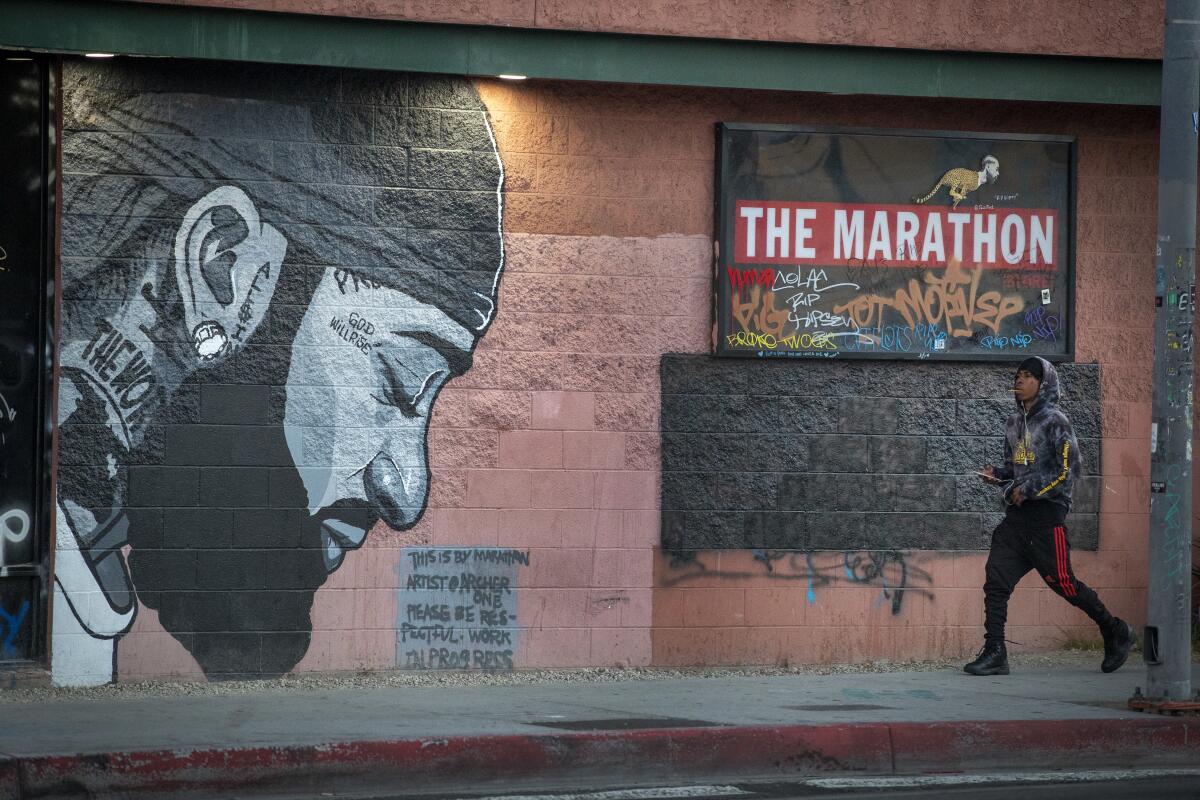
**
On the afternoon of March 31, Hussle was outside his store with longtime friend and employee Herman “Cowboy” Douglas when a man named Eric Holder approached.
Holder, a Rollin’ 60, had not been seen in the neighborhood for some time. Hussle warned Holder to be careful because people were labeling him a snitch, according to Douglas’ grand jury testimony. Holder, an aspiring rapper, asked if Hussle had listened to his new song. Hussle said he had not.
Holder then left, returned and, according to prosecutors, shot Hussle at least 10 times. Two other men were injured.
The thousands of mourners who flooded into the Marathon parking lot eventually thinned. But fans from Seattle, Texas, Canada and elsewhere keep showing up at Slauson and Crenshaw.
“It inspires me to be better at my schoolwork, to be like him,” said Ahmad Allen, 11, who was visiting from Philadelphia recently.
After Hussle’s death, the L.A. Police Department stepped up its presence at the parking lot. On July 8, LAPD Chief Michel Moore wrote to Gross, requesting a meeting to discuss how to make the property safer after what he described as calls to the police reporting assaults, batteries and shootings.
Al Labrada, commander of the LAPD’s South Bureau, met with Gross later that month to discuss lighting, cameras and other safety measures.
Media reports that the LAPD was leading a criminal investigation into Hussle are not accurate, Labrada said. Police did not have a problem with Hussle’s store, he said, only with the people hanging around outside.
But Labrada added that the parking lot’s popularity was “one of the reasons that resulted in the murder of Nipsey Hussle.”
**
Across Slauson from the Marathon store on a recent night, Hussle’s songs blared from speakers as Adrena Hodge sold tacos from a sidewalk stand. Hodge, who is from the neighborhood and knew Hussle, said police were often at the parking lot, so there was no danger to tourists who were coming to “show love and respect.”
Tony Broomfield, the owner of the taco stand and a member of the 57 Neighborhood Crips, said Hussle’s music gave him hope when he was at a low point in jail.
“We don’t want this man’s property, everything he worked for, to be torn down and destroyed over somebody’s allegations,” he said.
Shamond “Lil AD” Bennett, a member of the Rollin’ 60s, said he’s suspicious that city officials are trying to tarnish Hussle’s legacy. “They’re not causing no trouble,” he said of his fellow gang members visiting the parking lot. “If the world can come do it, why is it that people who grew up around here can’t do it?”
Since Hussle’s death, complaints from residents have centered on tourists blocking driveways or speeding on side streets, not on crime in the parking lot, said Kahllid Al-Alim, president of the Park Mesa Heights Community Council.
With construction of a new Metro line underway nearby, Al-Alim said he believes powerful interests are trying to seize the property for their own aims — a common if unproven fear in South L.A. amid rising property values.
“The homies are going to hang out at a store,” Al-Alim said. “That’s going to happen. But there’s no gangbanging activity and there’s no criminal activity.”
City Councilman Marqueece Harris-Dawson, who represents this part of South L.A., said the city attorney typically initiates nuisance abatement investigations after numerous complaints. He said his office has not received calls from residents about the parking lot, nor has a pattern emerged from police reports that would peg it as a hotbed of crime.
The night before the fence was erected, young men stood in the parking lot in clusters of twos and threes. They said they did not want to speak with mainstream authorities, including the media. But they emphasized that they had no intention of harming visitors.
“You were greeted nicely, weren’t you?” one said to a Times reporter.
Nipsey Hussle’s brother, Samiel Asghedom, issues a statement on the development of the Marathon Clothing store lot.
Skipp Townsend, a senior figure among L.A. gang interventionists, said he wants the Marathon parking lot to be a place where local people, including gang members, can gather and help each other — and to celebrate milestones such as Hussle’s birthday on Thursday.
The community has “already been victimized by a horrible shooting,” Townsend said. “What we need is to heal, not to be put in jail cells or displaced.”
After the fence went up, tourists expressed disappointment that they could not set foot on the parking lot, making do with selfies in front of a mural of Hussle with angel wings.
Hussle’s brother, Samiel, said he hopes the lot will one day become a fitting legacy.
“Nipsey Hussle Tower will inspire and show the people that even though you come from nothing you can achieve greatness,” he told The Times.
More to Read
Sign up for Essential California
The most important California stories and recommendations in your inbox every morning.
You may occasionally receive promotional content from the Los Angeles Times.












